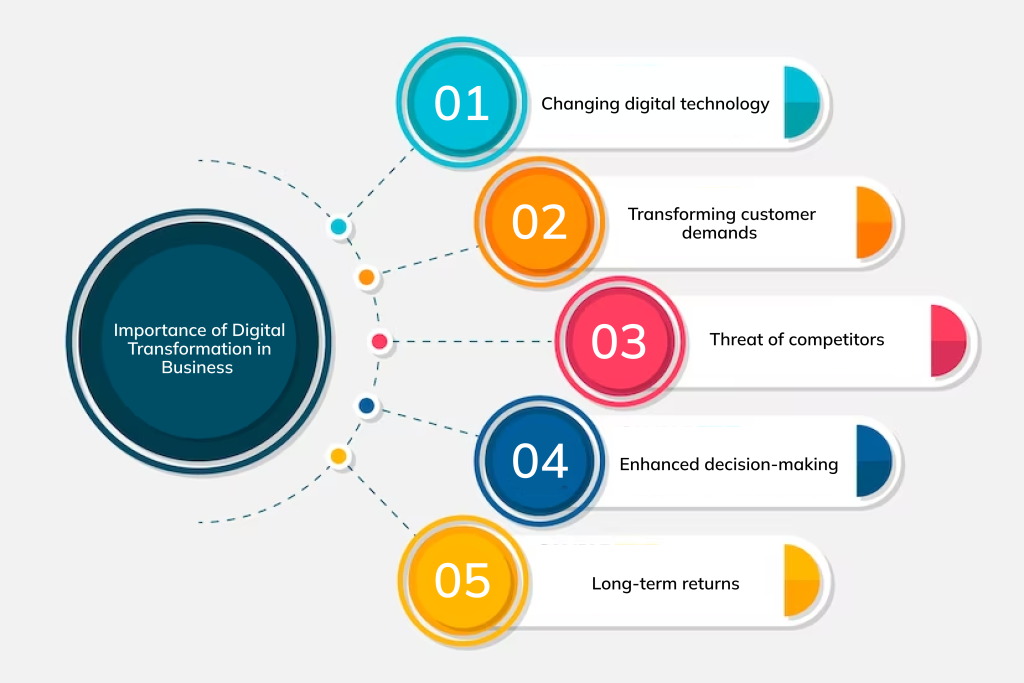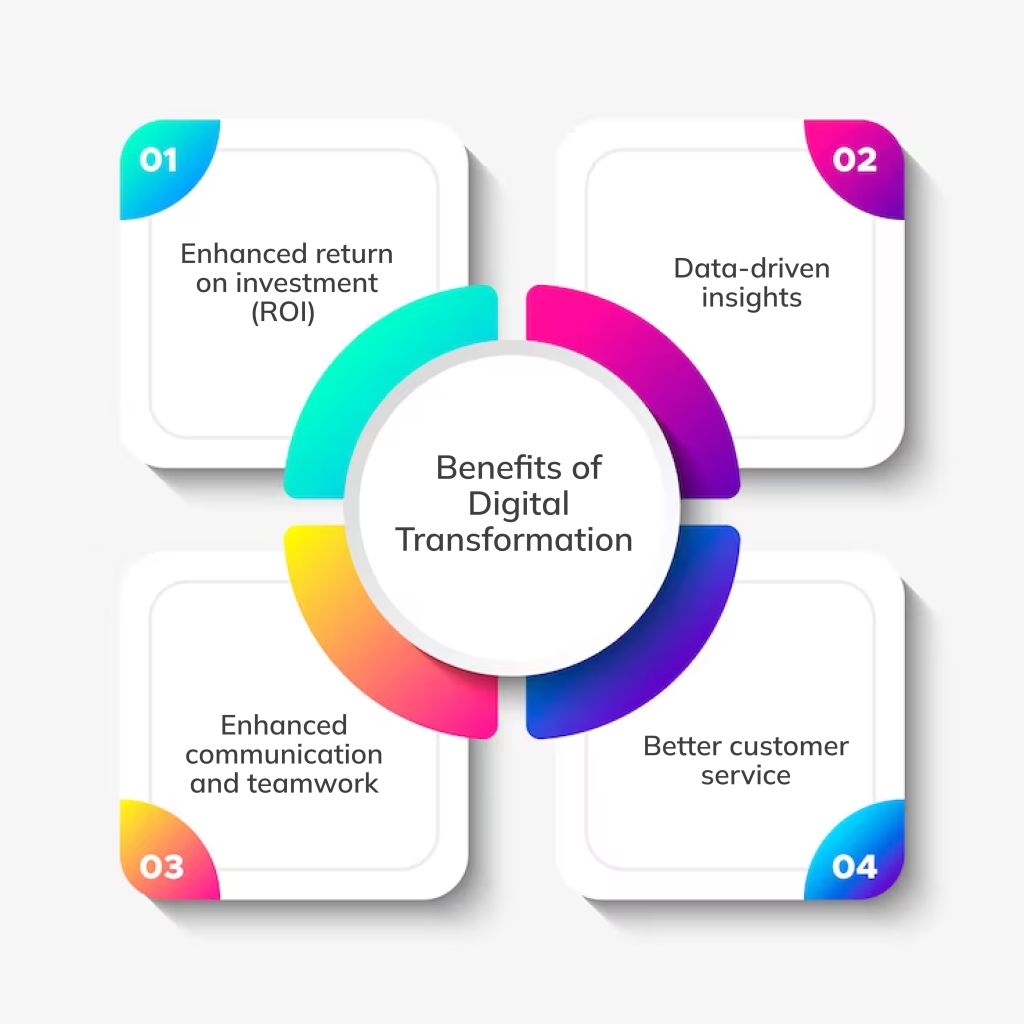Unlocking the Potential of Digital Transformation: Why and How it Matters?
28 Apr 23 


What does a digital transformation entail?
Businesses that can’t shift and respond to today’s hectic, technologically advanced world risk falling behind.
However, what exactly does “digital transformation” include, and why is it so crucial for businesses?
Businesses must now undergo a digital transformation to remain competitive in today’s economy. All businesses are connected via smartphones, and therefore mobile app development is highly dependent upon digital transformation.
It is a multidimensional process that enhances the client experience, increases company productivity and quickness, and unlocks value for many business organizations.
Let’s explore the global realm of digital transformation in this blog article and examine what it is and why it is essential for organizations that intend to remain competitive, not just a trend.
What is Digital Transformation?
Digital transformation incorporates technological innovations into every aspect of an organization, including its operations, services, and products, to provide value to its clients.
Digital transformation requires more than being able to keep up with your sector and other parts of the world in today’s highly linked global environment. It also requires constant innovation and the search for novel, more efficient ways of operating.
This calls for a culture open to accepting change, innovation, and failure, as well as introducing novel innovations to assist your staff and consumers better.
The road to digitalization can take numerous paths, and each company’s journey will be distinctive.
For instance, a business might implement AI or cloud computing to improve its client experience. Or, it might change its supply chain so that machine learning is used more effectively.
Additionally, a company may accurately predict customers’ desired products in just a few weeks and then change operations to meet those demands.
But starting a digital transformation road always calls for a shift in mindset. It provides a possibility to completely reassess how firms work.

Importance of Digital Transformation in Business
Let’s look at the importance of digital transformation in business.

Changing Digital Technology
Technology is evolving quickly. Every company must adapt to this new business landscape and these advances. The strategies and approaches that worked in the past are likely ineffective today.
All six layers must be in sync for a business to succeed in the digital era: procedure, platform, individuals, goods, promotion, and user experience.
The firm will only succeed if those align with the digital transformation.
Transforming Customer Demands
Each company is working hard to keep up with the increasing demands of customers. As a result, consumers can now research options much more quickly than previously to satisfy their needs.
Because of this, each business must exert additional effort to keep its clients. It will be feasible only if the company undergoes a digital transformation to meet customer demands.
Threat of Competitors
Companies may now take the lead because of changes in technology and capacity that were unimaginable just a few years ago.
They will undoubtedly fall behind their rivals if they do not adapt to this development. A different company will implement digital transformations if an organization does not.
Enhanced Decision-Making
Big data can benefit the organization when data and analytics are at the center of an organization’s digital transformation strategies.
The Internet of Things (IoT) has given organizations access to a more significant amount of data than at any time before.
With the right mix of statistical tools, this data may be translated into essential company insights that can help you make quicker, more accurate decisions.
The more deeply ingrained tools for analysis are in company activities, the more fully integrated and effective they are.
Long-Term Returns
The benefits of digital transformation will continue for a long time, even if it may require significant financial outlays, training for employees, and organizational procedure revisions.
Companies will set aside 10% of sales for establishing and carrying out their digital strategy. It demonstrates the long-term effort that digital transformation requires.
A digital transformation is essential if your business hopes to benefit in the long run from implementing digital technologies.
Benefits of Digital Transformation
Besides keeping up with businesses leading the digital revolution, there are several advantages to digital transformation.

Enhanced Return on Investment (ROI)
Businesses that participate in and finish their digital transformations have profitability that is 16% greater than the sector average.
It is difficult to dispute that introducing digital systems and procedures can speed up manufacturing and operations to spur business growth, even though this number may fluctuate.
Data-Driven Insights
Digital tools assist organizations in collecting, organizing, and analyzing massive amounts of data.
Departments can use actionable insights to optimize processes, manufacturing, accounting, and advertising. In addition, tools for business intelligence assist decision-makers in their use of data.
Enhanced Communication and Teamwork
Through digital tools that promote enhanced interaction and collaboration, teams can experience increased productivity.
There are several possibilities for digital collaboration, such as Microsoft Teams or Slack, email services like Outlook or Gmail, or team-building applications like Google Docs and Miro.
Better Customer Service
Using digital technologies can give users a more smooth and transparent experience.
Firms can use digital technologies to track metrics when interacting with consumers via email marketing and social media.
An organization may better serve various client groups using the digital infrastructure to achieve value propositions like quick delivery, affordable price, and high quality.
As an outcome, regardless of alternatives that are rivals, customers will be more inclined to select that company’s goods.
Application of Digital Transformation
Major applications of digital transformation are listed below.
Banking
Different mobile banking choices are now possible due to significant improvements in the banking industry.
Take the evolution of payment methods such as cash, debit cards, automated teller machines (ATMs), and cardless systems like Apple Pay, Venmo, and Wise.
Manufacturing
Numerous companies undertake digital transformation to establish more streamlined, effective supply chains.
They lower expenses, maintenance requirements, and usage using AI, predictive analytics, and other AI-based techniques.
Healthcare
The transition from manual patient records to electronic health records (EHR), which includes patient online health monitoring portals and, particularly after COVID-19, virtual doctor appointments, will be covered in the digital transformation.
The medical industry is being digitally transformed, which enhances interactions and produces more thoughtful clinical decisions.
Final Thoughts
Companies are reinvented by digitalization, which is also seizing distinct competitive advantages. Yet when it comes time to alter how they do business, firms continue to be reluctant.
The continual development of new market actors, off-site movement, and constant connectivity considerably influence our digital, international, and excitable-connected world.
This world is distinguished by transformation at both the social and technological levels.
The need to reinvent oneself in order to compete in today’s technologically advanced environment means that digital transformation is no longer an option.
- Agentic AI1
- Android Development3
- Artificial Intelligence38
- Autopay1
- Classified App3
- Custom App Development5
- Digital Transformation12
- Doctor Appointment Booking App14
- Dropshipping1
- Ecommerce Apps40
- Education Apps2
- Fintech-Apps38
- Fitness App4
- Flutter4
- Flutter Apps20
- Food Delivery App5
- Grocery App Development1
- Grocery Apps3
- Health Care10
- IoT2
- Loyalty Programs11
- Matrimony Apps1
- Microsoft1
- Mobile App Maintenance2
- Mobile Apps132
- On Demand Marketplace1
- Product Engineering6
- Progressive Web Apps1
- React Native Apps2
- Saas Application2
- Shopify9
- Software Development3
- Taxi Booking Apps7
- Truck Booking App5
- UI UX Design8
- Uncategorized7
- Web App Development1



















Comments